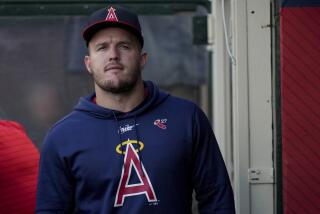Mike Young Doesn’t Feel Part of Orioles
- Share via
MIAMI — He has tucked himself into an apartment in far North Miami, where he’s physically, if not psychologically, separated from his teammates. That’s a symbolism not lost on Mike Young.
Once upon a time, he was going to be the Baltimore Orioles’ next superstar. He was big and strong and personable, and coincidentally, could hit 450-foot home runs from both sides of the plate.
He was a No. 1 choice in the winter draft of 1980, and by the summer of ‘81, at age 21, was at Class AAA Rochester and on the threshold of a dream. Five years ago, the Orioles’ only regret was that their championship team was so set they didn’t have a place for him.
So it’s the spring of 1988, and he still hasn’t won a job. He will turn 28 next month, has flecks of gray in his closely cropped hair and is no longer the innocent, bright-eyed kid the Orioles once knew.
“I know they say the team isn’t set,” he said this week. “They say everyone who’s here will get a chance. ... But I’d say they probably know who’s going to play and who’s not. You keep your eyes open, you see things.”
If he keeps his eyes open, he’ll see that the Orioles plan to move Larry Sheets from the outfield to designated hitter and that they appear to be leaning toward an outfield of Pete Stanicek, Ken Gerhart and Fred Lynn.
That’s one reason Young’s name surfaced in about a half-dozen serious trade discussions this winter and one reason he finds himself stuck on a team he no longer feels part of.
He has made it clear dozens of times that he’d like to be traded, and the Orioles, by their actions if not their words, have made it clear they’d like to oblige him. The Detroit Tigers and Oakland Athletics were both interested last winter, but the two sides never came close to agreeing on a swap.
“I kept up with what was going on,” he said, “and I was hoping for something. As a ballplayer, there’s nothing I can do but get ready to play. That may be hard to do under the circumstances, but I hope the Orioles know I’ll be out there busting my butt and giving 110 percent. If I can’t play here, hopefully I can go someplace else.”
Why he has never succeeded is a difficult question. Certainly, he has had his moments. He joined the Orioles on May 7 in 1984 and had 17 homers and 52 RBI in 401 at-bats. Seattle’s Alvin Davis was the only American League rookie with more home runs, and Young’s sophomore season was even better. He finished with 28 homers and 81 RBI, but had 20 of those homers after the all-star break.
In one mighty stretch (July 12-Sept. 10), he hit 20 homers and drove in 49 runs in 51 games. His 32 RBI in August was a team record for one month, and when that season ended he was untouchable.
Since then, he has had problems. He went from 28 homers in 1985 to nine in 1986 and was eventually demoted back to Rochester for a month late in the season. In the never-ending game of adjust and readjust, he couldn’t keep up. Pitchers who’d once challenged him on the outside part of the plate were now feeding him high and inside fastballs, and he was unable to handle them.
But after returning to the Orioles late in the ’86 season, he hit .333 the remainder of the season, and the club was encouraged enough to plan on making him their full-time DH in 1987. That plan never had a chance to work because he tore a ligament in his right thumb during the second exhibition game and missed the first five weeks of the season.
By that time, the Orioles were floundering far out of contention with a front-office staff that knew it would probably be fired (and wasn’t disappointed). Under those circumstances, Cal Ripken Sr. managed every game as if it might be his last, and players in even mini-slumps found themselves buried on the bench.
Young was a victim of those moves, and while he did hit .240 and 16 homers in 363 at-bats he also struck out 91 times -- the 12th-highest strikeouts-to-at-bats ratio in the American League.
“I just never got untracked,” he said. “So many people were under pressure, and the people in here (the clubhouse) knew it. I don’t blame anyone because people were frustrated, but I ended up pressing and so did a lot of other people.”
If hard work is an advantage, he ought to have one. He lifted weights and ran three times a week and he became an orange belt in the martial art of kung fu.
“I’m not here to stir up trouble,” he said. “If I’m going to be here, there’s nothing I can do about it. I feel good about myself right now, and I think, if I can stay healthy, everything will fall into place. Last year was the first time I’d been hurt, and it came at a bad time. It was depressing. I’m not taking a trade for granted, and I’m not taking a starting job for granted. I’ve been down here enough to be smarter than that.”
More to Read
Go beyond the scoreboard
Get the latest on L.A.'s teams in the daily Sports Report newsletter.
You may occasionally receive promotional content from the Los Angeles Times.










